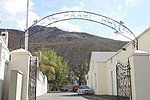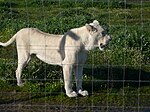Paarl (; Afrikaans: [ˈpɑːrl̩]; derived from Parel, meaning "pearl" in Dutch) is a town with 285,574 inhabitants in the Western Cape province of South Africa. It is the third-oldest European settlement in the Republic of South Africa (after Cape Town and Stellenbosch) and the largest town in the Cape Winelands. Due to the growth of the Mbekweni township, it is now a de facto urban unit with Wellington. It is situated about 60 kilometres (37 mi) northeast of Cape Town in the Western Cape Province and is known for its scenic environment and viticulture and fruit-growing heritage.Paarl is the seat of the Drakenstein Local Municipality; although not part of the Cape Town metropolitan area, it falls within its economic catchment. Paarl is unusual among South African place-names, in being pronounced differently in English than in Afrikaans; likewise unusual about the town's name is Afrikaners customary attachment to it, saying not in Paarl, but rather in die Paarl, or in die Pêrel (literally, "in the Paarl").
Paarl gained additional international attention when, on 11 February 1990, Nelson Mandela walked, with live international television coverage, out of Victor Verster Correctional Centre (now known as Drakenstein Correctional Centre) in Paarl ending his 27 years of imprisonment, and beginning a course to South Africa's post-apartheid era and, notably, to multi-racial elections. Mandela spent three years in prison here living in a private house within the walls. Today, a bronze statue of Mandela stands outside the prison.
Paarl hosted 3 matches from the ICC Cricket World Cup 2003. The headquarters of Ceres Fruit Juices is located in the city, although its namesake and source of much of the fruit, Ceres Valley, lies around one hour's drive to the northeast.
The district is particularly well known for its Pearl Mountain or "Paarl Rock". This huge granite rock consists of three rounded outcrops. Paarl Rock consists of intrusive igneous rock.






